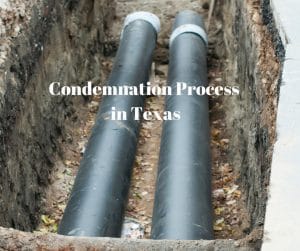What Is the Condemnation Process in Texas
Do you know what eminent domain and condemnation are? If you’re a Texas landowner, you might become involved in the condemnation process if the State’s power of eminent domain is used to take some or all of your property for a public purpose like a new pipeline or powerline.
In this video, Attorney Philip Hundl describes the condemnation process, and in an earlier video, Mr. Hundl gives a general overview of eminent domain and condemnation in Texas. If you have questions or you’d like to make an appointment with Mr. Hundl or one of our other experienced attorneys, please call our office at 800-929-1725.
Summary of the Condemnation Process in Texas Video
Hi, I’m Philip Hundl. I’m an attorney in Wharton County. Our law firm Wadler, Perches, Hundl and Kerlick serves Wharton County, Fort Bend County, Matagorda County and the surrounding counties. My area of practice focuses on condemnation and eminent domain.
I spoke in an earlier video about the initial circumstances in which a landowner may faced with a condemnation proceeding or eminent domain action by a private company. Now I’d like to cover Part Two of what happens if you the landowner and the private company, in this case let’s call it the pipeline company, cannot reach an agreement on how much you should be compensated for the pipeline easement that you’re going to grant to the pipeline company.
What happens next? Is it over? Does the company have to reroute its pipeline? If that pipeline company has the right of eminent domain or the right of condemnation, then there is a condemnation process. The condemnation process is set out in Texas Property Code Chapter 21.
Start of the Condemnation Process
The steps are as follows. You have to receive your Landowner’s Bill of Rights. The pipeline company in this example would provide you with its valuation of your property that it intends to acquire by condemnation. Then the pipeline company has to offer you what’s called a final bonafide offer, and that provides you with the highest number that the pipeline company would be offering you up to this point. And you have a certain amount of time to evaluate that offer and decide if you want to accept it or not.
Filing of a Condemnation Suit
If you choose to reject that offer, then the next step most likely will be the pipeline company filing a condemnation suit against you, and that condemnation suit would typically be in the county in which the project is going to occur, or where your land is located. That condemnation process begins with you being served with a lawsuit, so you may be hearing a knock on your door with a sheriff or constable or private process server providing you with the condemnation lawsuit, the legal papers filed by the pipeline company.
Next, you’ll have a certain amount of time to answer that lawsuit and by meaning answer, I mean a written answer which should be drafted with the assistance of an attorney. Your attorney will provide a proper answer or response to the pipeline company’s lawsuit.
Special Commissioners Determine an Award
At the next step, the pipeline company will request that the court appoint special commissioners to evaluate the value of the land that’s going to be taken by the pipeline company. The special commissioners are a panel of three commissioners that are landowners in the county. They will typically visit the property, seek input from other experts in the industry if they see fit, and then come up with a determination of the value of the property.
How will they do that? They will do that at a special commissioners hearing in which the pipeline company will have the ability to put on testimony or evidence typically by and through their expert of what the pipeline company believes the valuation of your property or the easement would be. Then you the landowner will be able to put on your own testimony by and through an expert or evidence of what the valuation of the property is from your perspective.
Taking all that in consideration, the special commissioners will be able to formulate an award, it’s called an award, of the valuation that they believe the land is worth or the damages caused by the pipeline company’s condemnation action. Once that award has been issued, then the landowner can choose to do nothing and accept it or you can object to the award.
If you choose to object to the award, then you must properly object to the award within the time allowed, and then proceed within that same lawsuit to a final trial either by judge or jury.
As a Landowner, You Have Rights in the Condemnation Process
So hopefully, this discussion has helped you, the Texas landowner, better understand the process of condemnation. First and foremost, you as a landowner need to know that when you’re faced with a condemnation action you have rights. You could be approached by a private company granted the power of eminent domain, a pipeline company, a power line company or a governmental entity that is seeking to acquire your land. These entities could seek an easement over your property or a fee simple interest in your land.
You have certain rights and these rights are set out in the Landowner Bill of Rights and the Texas Property Code. There’s a procedure and process that has to be followed, and you the landowner, with the assistance of your attorney, need to make sure that it is followed.
If your land is subject to condemnation, then you should talk with an experienced attorney to help ensure that your rights are respected. Call us at 800-929-1725 to get the experienced help you need. We have offices in Wharton and El Campo in Wharton County and in Richmond and Fulshear in Fort Bend County. Our newest office is in Bay City in Matagorda County.
Mr. Hundl has also done videos discussing Eminent Domain and Condemnation and Negotiation in Texas Condemnation Proceedings.











